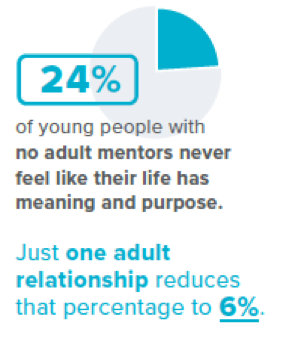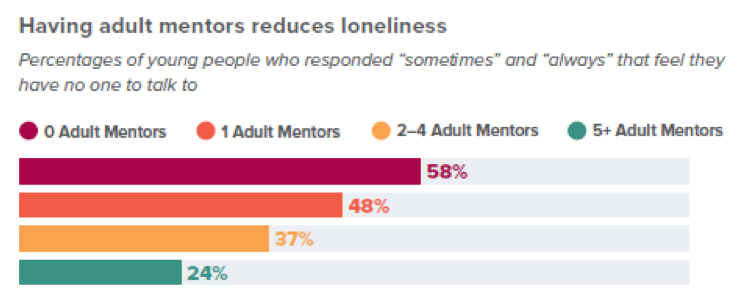By Kevin Singer
My mom holds on to all of our family’s keepsakes. While visiting her over Christmas, I found some postcards from the turn of the 20th century sent back and forth by family members during their summer trips across America. I was impressed by how disciplined they were to continue sending postcards every week, even if there really wasn’t much to share. When I mentioned this to my mom, she said that postcards were the only sure way of communicating on the road.
Despite the limits of communicating much through postcards, it was easy to see: These family members cared for each other. The act of sending and receiving postcards from cities big and small across America, even if their updates weren’t very interesting, demonstrated the lengths they were willing to go to hear from each other.
How different things are now. Today, young Americans have unprecedented connectivity to the outside world. They have constant access to news and information, and can communicate with billions of people at the push of a button through social media and other technologies for personal communication. Yet, the opposite effect seems to have happened. Instead of facilitating meaningful relationships of care, a digital sea of impersonal bonds have made young people lonelier than ever.
A digital sea of impersonal bonds have made young people lonelier than ever.
Young people need adults they trust
A 2019-2020 study from Springtide Research Institute discovered that nearly 40% of young people ages 13-25 say they feel they have no one to talk to and that no one really knows them well, at least sometimes. While social distancing certainly hasn’t helped, Gen Z’s loneliness was found to be even higher before the COVID-19 pandemic began, prompting the global health service company Cigna to declare them “the loneliest generation In America.”
Fortunately, there may be a cure. Springtide discovered that as the number of trusted adults in a young person’s life increases, feelings of loneliness and purposeless decrease.
This is good news — except there’s just one problem: Just 8% of young people ages 13-25 say there’s a religious leader in their life (e.g. a pastor, priest, or rabbi) they can turn to if needed. Even worse, just 1% of young people say a religious leader personally checked in with them as shutdowns and social distancing began in Spring 2020.
As a result, we can conclude that young people are finding support and empowerment when they turn to older adults, and almost none of those adults are pastors.
Just 1% of young people say a religious leader personally checked in with them as shutdowns and social distancing began in Spring 2020.
Young people value your relationship over your institution
With so many churches sporting youth ministries, why aren’t young people confident they can turn to a pastor?
Springtide’s study offers a big clue: Over half of young people who affiliate with a religion or denomination told us they don’t trust religious institutions. Though they may attend youth group and worship services, even fairly consistently, they aren’t having the experiences that are needed to build trust.
Springtide found that young people are more likely to trust adults who rely on relational authority to influence their lives than institutional authority. Relational Authority arises when one combines the sharing of wisdom and expertise with the practices of listening, transparency, integrity, and care. In other words, young people need to feel cared for before they can be receptive to the influence of others in their lives.
Institutional authority, on the other hand, assumes that one’s expertise, accolades, or connections do the heavy lifting when it comes to building relationships. It follows logically that if many young people at your church are struggling to trust your church, then engagement that feels institutional in nature — programmatic and impersonal — won’t help toward nurturing trust with them.
Tips for building trust with young people
With that in mind, pastors and youth ministers should consider how they can communicate to young people that their personhood is the priority, not a point you’re making or a program you’re pushing. Here are a few tips, drawn from what young people expressed to us:
1. Talk with them — and really listen — before trying to fix them. 83% of young people say they are more likely to take advice from someone who cares about them.
2. Be vulnerable and authentic. 79% of young people say they trust someone who shares things about their life. One young person told us, “There was a lot of genuine sharing with my mentor…when they were vulnerable with me, I felt safe to be vulnerable with them. Sharing hard situations, hard stories in their lives. That vulnerability created a space for me.”
3. Highlight shared experiences and values. 80% trust those who understand their lived experiences. Young people today are also fielding a number of complex social and political issues and feel some pressure to clarify their values and be actionable about them. Whether it’s racial justice, political polarization, navigating diversity, or what it means to be pro-life, a willingness to sit with them in these issues and discuss your own values demonstrates that you are relatable and appreciate the questions they are navigating.
Other practical steps for building trust with young people include remembering and celebrating milestones in their life, advocating for them if they are facing hardship, or giving them a platform to use their own voice. Simply remembering their birthday can go a long way.
Young people are growing spiritually and need encouragement
Though they may not be embracing religious institutions and church programs right now, many young people are finding ways to grow in their faith during the COVID-19 pandemic. Though about half say their faith has remained steady, over a third of young people (35%) say their faith has gotten stronger since the pandemic began, far more than those 11% who say their faith has gotten weaker. Even more, 46% say they’ve started new religious or spiritual practices during this time, far more than the 27% who say they’ve stopped some religious or practices.
With this in mind, pastors and youth ministers have an opportunity to encourage and serve the growth already at work among those young people who say their faith has gotten stronger, while sustaining and deepening the faith of those who say their faith has been steady, and helping to anchor those who say their faith has gotten weaker.
Make no mistake: Young people need you right now. They are experiencing record loneliness. They have low levels of trust in most traditional institutions, and they are likely not responding to the efforts these institutions are making to connect with them. But they are—amid all these realities—seeking meaning, navigating questions of identity, and pursuing community. And they need trusted adults to listen to, care for, and guide them.
The charts are courtesy of the Springtide Research Institute.






Comments and Pingbacks
2021-03-09 06:00:49
Explainer: Who is Gen Z and What Do They Want? | Intersect
[…] few weeks ago, I (Kevin) wrote for the Intersect Project about how little engagement there is between Gen Z and faith leaders. As […]